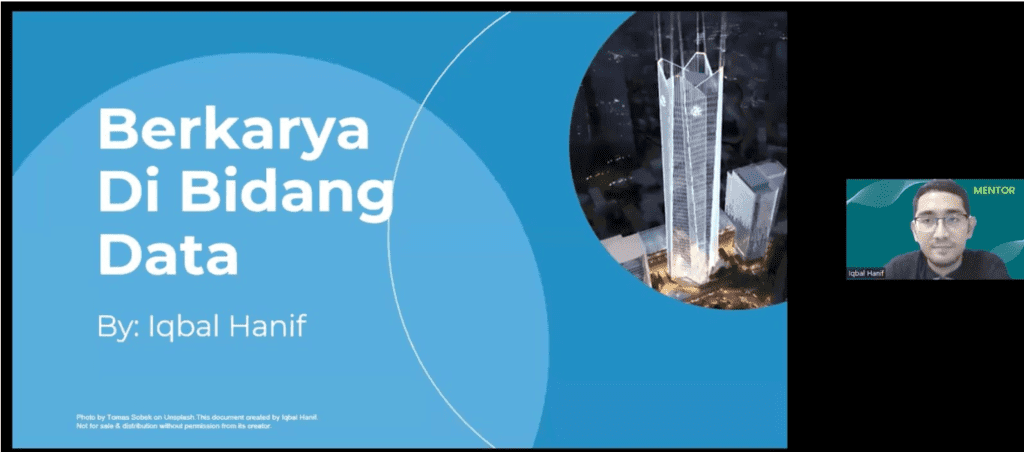
Master’s Degree Prospects at a Private University: Exploring The Career Opportunities
July 30, 2024
Two UMN Research Teams Receive Grants for The 2024 PKM Program
August 1, 2024
DQLab Working on Data with Iqbal Hanif (DQLab)
Tangerang—Amid rapid technological development, data-driven decisions have become an urgent need in various sectors. However, a big challenge arises because many industry professionals still lack adequate knowledge and skills in the data field. This lack of understanding makes the implementation of data-driven decisions a crucial issue that must be addressed immediately to ensure the efficiency and effectiveness of decisions in various industries.
DQLab, one of the data accelerators in Indonesia, held another Free Class, Batch 37, entitled “Working in the Data Field.” Inviting Iqbal Hanif, a Data Analyst at Telkom Indonesia, the class discussed the crucial role of data analysis in various industries, such as telecommunications, agriculture, and MSMEs.
Hanif explained how data-driven decisions help achieve objective and accurate decisions, reducing reliance on intuition alone. He also outlined the stages of data science, various roles in the data field, and the latest trends, such as machine learning and the tools used. In addition, Hanif shared career guidance for data novices and emphasized the importance of training, competition, and participation in the data community to achieve success.
Hanif started the session by explaining the use of data analysis in various fields such as telecommunications, agriculture, MSMEs, and so on. In addition, the function of data is to support the data-driven decision process or decision-making based on data so that it is objective and not harmful. This has its challenges with subjective decision-making that still relies on intuition, making it inaccurate.
The simplest example of data-driven decisions is the use of the Apple Watch or other smartphone applications to track how many steps we take every day. If we follow the health recommendations from the medical world, humans are supposed to move 5,000 – 10,000 steps a day. However, when that target is not achieved, the app can analyze why the user’s movement has decreased, a prediction of steps in the following days, and recommendations to reach the target.
This is one of the many examples of the application of data science in technology and health. Therefore, according to Hanif, data science can be explained as a discipline that utilizes scientific methods such as mathematics, statistics, algorithms, and computer systems to extract valuable knowledge and insights from structured and unstructured data according to the domain knowledge of their respective fields of work.
He also explained the stages of data science: descriptive analysis to determine what is happening in the data or phenomenon being analyzed; diagnostic analysis to determine why the phenomenon can occur; predictive analysis to predict what will happen in the future; and prescriptive analysis to provide deeper predictions and recommendations on what steps to take with the data. All of these steps must be done sequentially to produce accurate decisions.
Hanif also explained the roles in the data field. First are data analysts, whose main task is to process data. Data analysts can advance into business analysts or business intelligence. Second is data science, whose job is to process data more deeply by modeling data, conducting research, and so on. Third is a data engineer, whose job is to prepare and maintain the database system utilizing the system created by the data scientist.
Hanif also discussed daily tasks in the data field in this session. Following the trend in the data field in recent years, Hanif gave a specific example of Machine Learning. Those who work in the data field usually perform supervised and unsupervised learning processes such as banking fraud prevention efforts, cross-selling and up-selling, TV rating predictions, network predictions, and customer or user segmentation in various business fields.
Furthermore, workers in the data field also perform descriptive analysis processes, utilizing statistics to evaluate various things and visualize data. These examples are done with the Cross Industry Standard Process for Data Mining (CRISP-DM) framework or lifecycle.
Furthermore, Hanif explained what tools are commonly used in the data field. These tools can also be adjusted to the needs of each job. For example, those related to databases can use MySQL and PostgreSQL, ETL can use Pentaho and Talend, analysis uses R and Python, and visualization Tableau, Looker Studio, and Power BI.
Hanif also gave an overview of the salary range in the data field based on the 2023 survey. Someone who works in the data field can get a different salary range according to the focus area of each company. In general, the salary range in the data field in Indonesia ranges from Rp5,000,000—Rp20,000,000. However, this can also be influenced by career paths ranging from officer (entry-level) to junior, middle, and senior to principal, back to the policies of each company.
In addition, the salary range in various companies can also be based on performance, portfolio, and work experience. This is also due to the intense competition in the data field, whether in terms of education or other preferences.
Therefore, Hanif provides career preparation recommendations for beginners who want to have a career in data. These recommendations include improving skills through training, competing in competitions, publishing work or data portfolios on various platforms, starting a career with internships, and, most importantly, joining the data community. The goal is to expand networking, thus expanding the opportunity to achieve a dream career.
One step that you can take is to join DQLab’s Bootcamp Live Class program. Where there are many choices of classes according to each role you want to learn, a learning curriculum that has been adapted to industry needs comprehensively, complete modules, 24-hour AI Chatbot assistance, HERO (Hands-On, Experiential Learning & Outcome-based) learning methods that are designed to be beginner-friendly and have been proven to produce excellent talents who have successful careers in the data field.
So, what are you waiting for? Prepare yourself for a career in data by signing up or joining the Machine Learning & AI for Beginner Bootcamp now!
by Lisya Zuliasyari | DQLab
English translation by Levina Chrestella Theodora
Kuliah di Jakarta untuk jurusan program studi Informatika | Sistem Informasi | Teknik Komputer | Teknik Elektro | Teknik Fisika | Akuntansi | Manajemen| Komunikasi Strategis | Jurnalistik | Desain Komunikasi Visual | Film dan Animasi | Arsitektur | D3 Perhotelan , di Universitas Multimedia Nusantara. www.umn.ac.id





